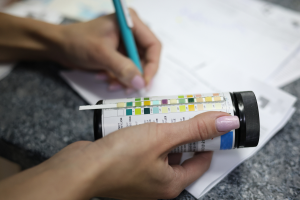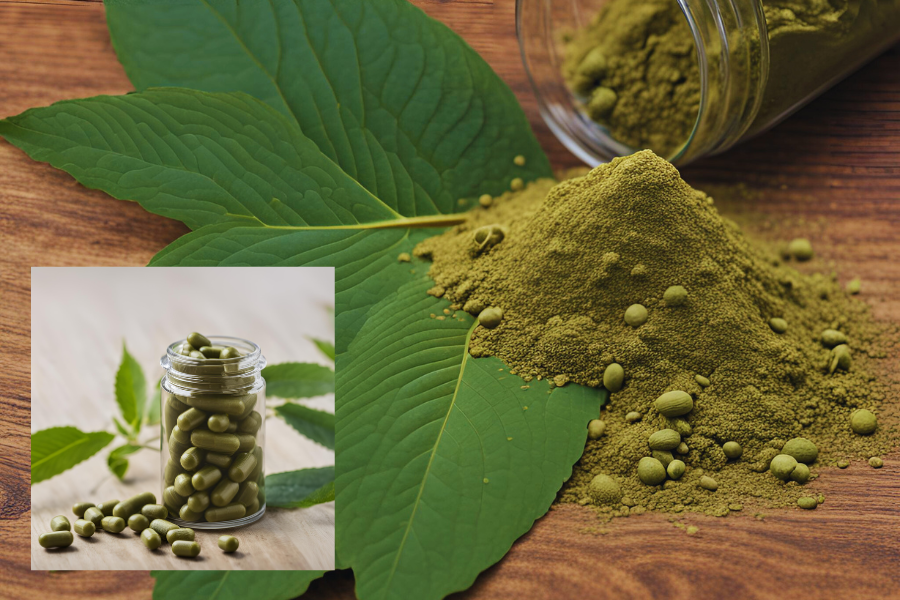Kratom has also been used as a substitute for opioid withdrawal and pain relief, but are there signs of it on a drug test? In recent years, Kratom has gained a lot of attention as a prescription substitute for pain withdrawal and a method to treat addiction and withdrawal symptoms.
If you are deciding to use Kratom or are already using it, you may be curious: Does Kratom Show Up on a Drug Test? You may also be considering the following concerns: How long does Kratom stay in one’s body, and the screening “block” for Kratom usage. With this blog post, this and many other questions can be answered.
What is Kratom?
Kratom is a tropical tree indigenous to Southeast Asia, specifically countries like Thailand, Malaysia, and Indonesia. The leaves of this tree contain active compounds known for their potential pain-relieving, anti-inflammatory, and mood-enhancing properties.
With a rich history spanning centuries, kratom has been traditionally used as a medicinal remedy for a range of ailments, including pain and diarrhea. More recently, it has gained attention for its potential to alleviate the symptoms of opioid withdrawal.
Kratom leaves can be consumed in various ways, either by chewing them directly or preparing them as a tea. Additionally, kratom is available in alternative forms, such as capsules or powders. While a small dosage of kratom can provide a stimulating effect, higher doses may induce a sedating effect reminiscent of opioids.
How Long Does Kratom Stay in the Body?
Kratom (Mitragyna speciosa) is a tropical tree whose leaves contain pharmacological qualities that can boost energy, relieve pain, and promote calm. Kratom has energizing effects at smaller dosages, but it can produce drowsiness at greater ones.
Although kratom is becoming increasingly popular, some studies have been conducted to investigate its effects and elimination times. An in-depth kratom study has been undertaken on animals but not on people, and it hasn’t been done since 2015.
Kratom has an average half-life of about 24 hours but can last up to 40 hours. As a result, kratom is thought to be eradicated from a person’s system within 6-9 days.
Does Kratom Show Up on Drug Tests?
The answer to the question “Does kratom show up on a drug test?” is dependent on some circumstances, including how long ago the individual used it and how much. It also depends on the type of drug test used. If a potential employer or someone else administers a 5-panel drug test, it will check for evidence that the individual has used five distinct types of drugs: marijuana, opiates, cocaine, amphetamines, and PCP.
Kratom will not appear on this drug test. If the test is a 10-panel drug test, kratom alkaloids may be detected. The 10-panel drug test searches for the same substances as the 5-panel test, plus barbiturates, benzodiazepines, methadone, methaqualone, and propoxyphene.
Specialized Tests: When Kratom Could Be Detected
While routine tests miss kratom, specialist drug panels can identify its presence. These tests focus on kratom’s individual alkaloids, primarily mitragynine and 7-hydroxy mitragynine.

Here’s a breakdown of detection techniques:
Urine Test: If a test specifically searches for kratom alkaloids, they may be found in urine up to a week after usage.
Blood Test: Specialized blood tests can detect kratom within 24 hours of use, but they are less frequent than urine testing.
Hair Test: Detecting kratom using hair follicle analysis is unusual, however, traces may be present for up to 90 days.
Saliva testing: Saliva testing is becoming more widespread, particularly in business settings. Kratom, on the other hand, is not normally up on a saliva drug test, even if the test is particularly designed to detect the material. Factors affecting the detection window
Even with advanced tests, various factors determine how long kratom is detectable:
Dosage: Increasing kratom consumption often broadens the detection window.
Frequency of Use: Regular kratom use might result in prolonged detection times.
Metabolism: Individual differences in metabolism can influence how rapidly the body removes Kratom.
Signs of Kratom Addiction
When someone develops a kratom addiction, they will exhibit indicators of it. Some of the most prevalent signs of addiction to kratom are:
- Hyperactivity
- Extreme levels of energy
- Weight loss.
- Lack of appetite
- Hallucinations
- Psychosis
- Feeling uncomfortable in social situations without utilizing kratom.
- Frequent urination
- Itchy skin.
- Nausea and vomiting.
- Diarrhea
- Constipation
- Sweating
- Seizures
- Often seem or behave sedated.
- Excessive sleep
How is Kratom Addiction Treated?
Kratom addiction may occur at a residential institution, where a person resides for many weeks and receives 24-hour care. Others find that outpatient therapy offers the concentrated assistance they require, beginning with a drug detox program to properly handle kratom withdrawal symptoms.
Following detox, outpatient treatments include partial hospitalization programs (PHP), which involve attendance at full-day sessions many times each week. Another alternative is intensive outpatient programs (IOP), which run for a few hours each day, a few days a week. Some IOP programs can be completed in the evening or virtually to accommodate individuals’ different schedules.
Attending many types of treatment allows patients to address the root causes of their addiction and learn how to avoid relapse. Individual therapy, family therapy, holistic therapy, and other approaches are common components of many treatment schemes. Prescription drugs can be used to alleviate kratom withdrawal symptoms and make the first days of sobriety easier to bear.
Get Help for Kratom Addiction in Atlanta Today
Drug addiction may be a concern in anyone’s life. When this occurs, it is critical to seek immediate assistance from a facility that is familiar with the complexities of addiction. If you are abusing kratom, other drugs, or alcohol, there is treatment available!
Revelare Recovery provides comprehensive outpatient addiction treatment programs, including evidence-based therapies like psychotherapy and counseling. We walk you through several types of therapy aimed at helping people accept being sober for life. We can also provide prescription drugs to help relieve any withdrawal symptoms that may arise.
If you are ready to deal with your kratom addiction and put drug misuse behind you, please visit Revelare Recovery or call us at (888) 341 0244. Our team is happy to explain how simple it is to join our treatment program and get healthy again.

